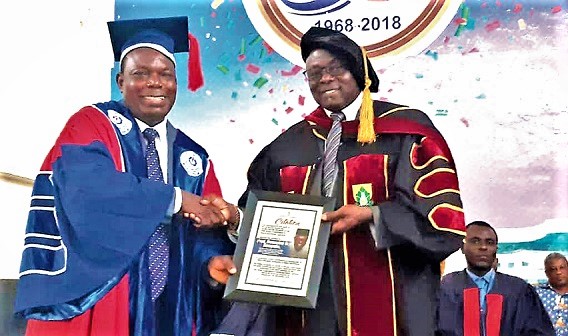
‘Support technical varsities to strengthen governance structures’
The government has been called upon to assist technical universities to strengthen their governance frameworks and mobilise resources to overcome the numerous challenges they face.
A former Vice Chancellor of the University of Cape Coast, Professor Domwini Dabire Kuupole, made the call at the 3rd Vice Chancellor’s Distinguished Lecture Series of the Ho Technical University.
He posited that the government needed to focus on massive investments in human capital development in technical-related disciplines and embark on a massive upgrade of facilities to make technical universities fit for purpose.
Delivering a paper as the guest speaker on the topic: "Implications of the Triple Helix Model for Technical Universities in Ghana: Fulfilling the University's Third Mission", Prof. Kuupole stated that the main objective for the establishment of technical universities in Ghana was to promote engineering, technical and vocational education training based on skills development and transfer of technology for the creation of wealth and employment opportunities to contribute to socio-economic development.
The bedrock of any nation's development, he said, depended largely on its advancement in science and technology.
"There is, therefore, the need for technical universities to remain innovative and produce students with high critical thinking to help identify solutions to national challenges," he said.
He added that no country could develop without quality technical and vocational education and training (TVET).
Challenges
According to Prof. Kuupole, in the midst of globalisation, technology explosion and rapidly changing industrial demands, technical education faced major challenges which continued to affect its capacity to contribute to the economy and social life.
He mentioned that the existing technical universities lacked adequate facilities and equipment for training the increasing number of students who gained admission.
Furthermore, he identified that there was inadequate qualified technical staff, both academic and non-academic in the technical universities, with majority of the existing staff lacking professional and practical experience.
Those challenges, he said, were coupled with poorly structured skills training and industrial internships for students.
He also noted that the negative public attitude and perceptions regarding technical and vocational education and training had affected technical universities, making reference to the long-held notion that vocational education was for "weak students who could not make it in class".
Way forward
Prof. Kuupole said professionally well-trained teaching staff and innovative curricula were very vital for the successful provision of socially responsive education in technical universities in order to produce a “critical mass of skilled people who can respond adequately to the current and future needs of the world of work and deal with issues of youth employability and self-employment".
“To complement all these, students also need to be equipped with technical and vocational skills so as to enable them to provide the requisite human capital for industries,” he added.
The Vice Chancellor, HTU, Prof. Ben Q. Hoenyenuga, said the technical universities would find their space in development if there was a strong collaboration among them, the government and industry players.
